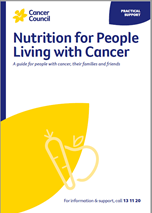- Home
- Pancreatic cancer
- Managing your diet and nutrition
- Tips for maintaining your weight
Tips for maintaining your weight
During and after treatment for pancreatic cancer, changes to what you can eat, how you feel about eating and how your body absorbs food can lead to unplanned weight loss. This can cause a loss of strength, increase fatigue and affect how you cope with treatment. The tips below may help.
Have regular mealsEat small meals frequently (e.g. every 2–3 hours), and have a regular eating pattern rather than waiting until you’re hungry. Keep ready-to-eat food on hand for when you are too tired to cook (e.g. tinned fruit, yoghurt, frozen meals). |
|
Choose nourishing food and drinkEnsure that meals and snacks are nourishing and include protein such as meat, chicken, fish, dairy products, legumes (e.g. lentils, chickpeas), eggs, tofu, nuts and nut butters. Choose nourishing drinks (e.g. milk, smoothies). A dietitian may also suggest nutritional supplement drinks. |
|
Load up your foodThere are different ways to add extra kilojoules to your food:
|
|
Adjust to taste changesYou may find your sense of taste changes after treatment. If food tastes bland, add extra flavouring such as herbs, lemon, lime, ginger, garlic, honey, chilli, pepper, Worcestershire sauce, soy sauce or pickles. Eating moist fruits such as berries or sucking boiled lollies can help if you have a bitter or metallic taste in your mouth. |
|
Avoid strong food smellsIf food smells bother you, ask family or friends to do the cooking. You may also prefer cold food or food at room temperature without a strong smell. |
|
Talk to a dietitianA dietitian can help if you are finding it hard to work out the right foods to help you gain weight. You should also check with a dietitian before cutting out particular foods. |
|
Follow your appetiteIt’s okay to focus on eating foods that you enjoy. Gaining or maintaining weight is more important at the moment than avoiding extra fat and sugar. |
→ READ MORE: Nausea and vomiting
Podcast: Appetite Loss and Nausea
Listen to more episodes from our podcast for people affected by cancer
More resources
Prof Lorraine Chantrill, Honorary Clinical Professor, University of Wollongong, and Head of Department, Medical Oncology, Illawarra Shoalhaven Local Health District, NSW; Karen Baker, Consumer; Michelle Denham, 13 11 20 Consultant, Cancer Council WA; Prof Anthony J Gill, Surgical Pathologist, Royal North Shore Hospital and The University of Sydney, NSW; A/Prof Koroush Haghighi, Liver, Pancreas and Upper Gastrointestinal Surgeon, Prince of Wales and St Vincent’s Hospitals, NSW; Dr Meredith Johnston, Radiation Oncologist, Liverpool and Campbelltown Hospitals, NSW; Dr Brett Knowles, Hepato-Pancreato-Biliary and General Surgeon, Royal Melbourne Hospital, Peter MacCallum Cancer Centre, and St Vincent’s Hospital, VIC; Rachael Mackie, Upper GI – Clinical Nurse Consultant, Peter MacCallum Cancer Centre, VIC; Prof Jennifer Philip, Chair of Palliative Care, University of Melbourne, and Palliative Medicine Physician, St Vincent’s Hospital, Peter MacCallum Cancer Centre and Royal Melbourne Hospital, VIC; Lucy Pollerd, Social Worker, Peter MacCallum Cancer Centre, VIC; Rose Rocca, Senior Clinical Dietitian – Upper GI, Peter MacCallum Cancer Centre, VIC; Stefanie Simnadis, Clinical Dietitian, St John of God Subiaco Hospital, WA.
View the Cancer Council NSW editorial policy.
View all publications or call 13 11 20 for free printed copies.

